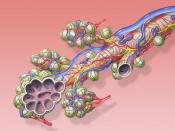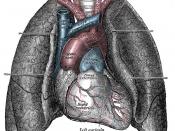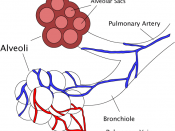The respiratory system is made up of the organs that deliver oxygen to the circulatory system for transport to all body cells. Oxygen is essential for cells, which use this vital substance to liberate the energy needed for cellular activities. In addition to supplying oxygen, the respiratory system aids in removing of carbon dioxide, preventing the lethal buildup of this waste product in body tissues. Day-in and day-out, without the prompt of conscious thought, the respiratory system carries out its life-sustaining activities. If the respiratory system's tasks are interrupted for more than a few minutes, serious, irreversible damage to tissues occurs, followed by the failure of all body systems, and ultimately, death.
While the intake of oxygen and removal of carbon dioxide are the primary functions of the respiratory system, it plays other important roles in the body. The respiratory system helps regulate the balance of acid and base in tissues, a process crucial for the normal functioning of cells.
It protects the body against disease-causing organisms and toxic substances inhaled with air. The respiratory system also houses the cells that detect smell, and assists in the production of sounds for speech.
The organs of the respiratory system extend from the nose to the lungs and are divided into the upper and lower respiratory tracts. The upper respiratory tract consists of the nose and the pharynx, or throat. The lower respiratory tract includes the larynx, or voice box; the trachea, or windpipe, which splits into two main branches called bronchi; tiny branches of the bronchi called bronchioles; and the lungs, a pair of saclike, spongy organs. The nose, pharynx, larynx, trachea, bronchi, and bronchioles conduct air to and from the lungs. The lungs interact with the circulatory system to deliver oxygen and remove carbon dioxide.
The flow of air...


